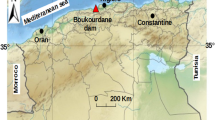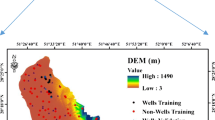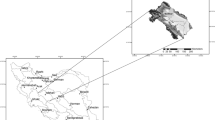Abstract
The analysis of groundwater resources is extremely important to the cultivation of crops, our daily lives, and sustainable growth. Thus, a precise and credible estimation of groundwater levels is crucial and helps to prevent resource depletion. Research in the past has shown that machine-learning approaches such as Artificial Neural Networks (ANN) and Adaptive Neuro-Fuzzy Inference Systems (ANFIS) are effective at mimicking complicated nonlinear problems and also integrating multiple techniques to develop an enhanced tool that improves the accuracy of the prediction model. This study presented prediction models that constitute hybrid techniques integrating ANN, ANFIS, and an Improved Reptile Search Algorithm (IRSA). In this case, IRSA is applied to identify the parameters of the ANN and ANFIS in order to improve the overall effectiveness of the forecasting models. After this, the developed hybrid approaches for groundwater level modelling were evaluated using four seasons (January to March, April to June, July to September, and October to December) of groundwater level data for India collected from the India Water Resources Information System. Also, the comparative study has done between ANN-IRSA, ANFIS-IRSA, and traditional ANN as well as ANFIS, which were evaluated on the same datasets. The ANFIS-IRSA model achieved optimal RMSE (0.4074, 0.3927, 4.5591, 1.8408), MAE (0.2329, 0.2516, 1.3644, 0.8612), MAPE (0.0201, 0.022, 0.04, 0.0664), R2 (0.9907, 0.9861, 0.9747, 0.9809), WI (0.9975, 0.9963, 0.9926, 0.9948), and PBIAS (0.2862, 0.0833, 2.7417, 1.7682) for four distinct seasons, which is exceptional in comparison with other models. Based on the results of simulations and comparisons, ANFIS-IRSA outscored other models on the same datasets and proved to be a robust method to predict time-series data.
Graphical Abstract



























Similar content being viewed by others
Data availability
The datasets analyzed during the current study are available in https://indiawris.gov.in/wris/#/groundWater
References
Abualigah L, Elaziz MA, Sumari P et al (2022) Reptile Search Algorithm (RSA): a nature-inspired meta-heuristic optimizer. Expert Syst Appl 191:116158. https://doi.org/10.1016/J.ESWA.2021.116158
Adil M, Ullah R, Noor S, Gohar N (2022) Effect of number of neurons and layers in an artificial neural network for generalized concrete mix design. Neural Comput Appl 34:8355–8363. https://doi.org/10.1007/S00521-020-05305-8/METRICS
Adnan RM, Mostafa RR, Dai HL et al (2023) Enhancing accuracy of extreme learning machine in predicting river flow using improved reptile search algorithm. Stoch Environ Res Risk Assess 37:3063–3083. https://doi.org/10.1007/S00477-023-02435-Y/METRICS
Alizamir M, Kisi O, Zounemat-Kermani M (2017) Modelling long-term groundwater fluctuations by extreme learning machine using hydro-climatic data. Hydrol Sci J 63:63–73. https://doi.org/10.1080/02626667.2017.1410891
Almotairi KH, Abualigah L (2022) Improved reptile search algorithm with novel mean transition mechanism for constrained industrial engineering problems. Neural Comput Appl 34:17257–17277. https://doi.org/10.1007/S00521-022-07369-0/METRICS
Armaghani DJ, Harandizadeh H, Momeni E et al (2022) An optimized system of GMDH-ANFIS predictive model by ICA for estimating pile bearing capacity. Artif Intell Rev 55:2313–2350. https://doi.org/10.1007/S10462-021-10065-5/METRICS
Asefpour Vakilian K, Massah J (2018) A fuzzy-based decision making software for enzymatic electrochemical nitrate biosensors. Chemom Intell Lab Syst 177:55–63. https://doi.org/10.1016/J.CHEMOLAB.2018.04.016
Banadkooki FB, Ehteram M, Ahmed AN et al (2020) Enhancement of groundwater-level prediction using an integrated machine learning model optimized by whale algorithm. Nat Resour Res 29:3233–3252. https://doi.org/10.1007/S11053-020-09634-2/METRICS
Boyacioglu MA, Avci D (2010) An Adaptive Network-Based Fuzzy Inference System (ANFIS) for the prediction of stock market return: the case of the Istanbul Stock Exchange. Expert Syst Appl 37:7908–7912. https://doi.org/10.1016/J.ESWA.2010.04.045
Chen W, Panahi M, Khosravi K et al (2019) Spatial prediction of groundwater potentiality using ANFIS ensembled with teaching-learning-based and biogeography-based optimization. J Hydrol 572:435–448. https://doi.org/10.1016/J.JHYDROL.2019.03.013
Dash NB, Panda SN, Remesan R, Sahoo N (2010) Hybrid neural modeling for groundwater level prediction. Neural Comput Appl 19:1251–1263. https://doi.org/10.1007/S00521-010-0360-1/METRICS
Di Nunno F, Granata F (2020) Groundwater level prediction in Apulia region (Southern Italy) using NARX neural network. Environ Res 190:110062. https://doi.org/10.1016/J.ENVRES.2020.110062
Elzain HE, Chung SY, Park KH et al (2021) ANFIS-MOA models for the assessment of groundwater contamination vulnerability in a nitrate contaminated area. J Environ Manage 286:112162. https://doi.org/10.1016/J.JENVMAN.2021.112162
Emamgholizadeh S, Moslemi K, Karami G (2014) Prediction the Groundwater Level of Bastam Plain (Iran) by Artificial Neural Network (ANN) and Adaptive Neuro-Fuzzy Inference System (ANFIS). Water Resour Manag 28:5433–5446. https://doi.org/10.1007/S11269-014-0810-0/METRICS
Eskandari-Naddaf H, Kazemi R (2017) ANN prediction of cement mortar compressive strength, influence of cement strength class. Constr Build Mater 138:1–11. https://doi.org/10.1016/J.CONBUILDMAT.2017.01.132
Fattahi H, Hasanipanah M (2022) An integrated approach of ANFIS-grasshopper optimization algorithm to approximate flyrock distance in mine blasting. Eng Comput 38:2619–2631. https://doi.org/10.1007/S00366-020-01231-4/METRICS
Garzón-Roca J, Marco CO, Adam JM (2013) Compressive strength of masonry made of clay bricks and cement mortar: estimation based on neural networks and fuzzy logic. Eng Struct 48:21–27. https://doi.org/10.1016/J.ENGSTRUCT.2012.09.029
Gholami V, Sahour H (2022) Prediction of groundwater drawdown using artificial neural networks. Environ Sci Pollut Res 29:33544–33557. https://doi.org/10.1007/S11356-021-18115-9/METRICS
Gleeson T, VanderSteen J, Sophocleous MA et al (2010) Groundwater sustainability strategies. Nat Geosci 3:378–379. https://doi.org/10.1038/ngeo881
Hornik K, Stinchcombe M, White H (1989) Multilayer feedforward networks are universal approximators. Neural Netw 2:359–366. https://doi.org/10.1016/0893-6080(89)90020-8
Husna NEA, Bari SH, Hussain MM et al (2016) Ground water level prediction using artificial neural network. Int J Hydrol Sci Technol 6:371–381. https://doi.org/10.1504/IJHST.2016.079356
Jang JSR (1993) ANFIS: adaptive-network-based fuzzy inference system. IEEE Trans Syst Man Cybern 23:665–685. https://doi.org/10.1109/21.256541
Jeong J, Park E (2019) Comparative applications of data-driven models representing water table fluctuations. J Hydrol 572:261–273. https://doi.org/10.1016/J.JHYDROL.2019.02.051
Jithendra T, Basha SS (2023) A hybridized machine learning approach for predicting COVID-19 using adaptive neuro-fuzzy inference system and reptile search algorithm. Diagnostics 13:1641. https://doi.org/10.3390/DIAGNOSTICS13091641
Jithendra T, SS B (2022) Artificial Intelligence (AI) model: Adaptive Neuro-Fuzzy Inference System (ANFIS) for diagnosis of COVID-19 Influenza. Computing 41:1114–1135. https://doi.org/10.31577/cai
Jithendra T, Basha SS, Das R, Gajjela R (2023) Modeling and optimization of WEDM of monel 400 alloy using ANFIS and snake optimizer: a comparative study. Proc Inst Mech Eng Part C J Mech Eng Sci. https://doi.org/10.1177/09544062231187207
Kara F, Aslantaş K, Çiçek A (2016) Prediction of cutting temperature in orthogonal machining of AISI 316L using artificial neural network. Appl Soft Comput 38:64–74. https://doi.org/10.1016/J.ASOC.2015.09.034
Khan MK, Zafar MH, Rashid S et al (2023) Improved reptile search optimization algorithm: application on regression and classification problems. Appl Sci 13:945. https://doi.org/10.3390/APP13020945
Kisi O, Azad A, Kashi H et al (2019) Modeling groundwater quality parameters using hybrid neuro-fuzzy methods. Water Resour Manag 33:847–861. https://doi.org/10.1007/S11269-018-2147-6/METRICS
Kumar A, Arora HC, Kumar K, Garg H (2023) Performance prognosis of FRCM-to-concrete bond strength using ANFIS-based fuzzy algorithm. Expert Syst Appl 216:119497. https://doi.org/10.1016/J.ESWA.2022.119497
India-WRIS (2022) https://indiawris.gov.in/wris/#/groundWater. Accessed 27 Mar 2023
Madani K (2014) Water management in Iran: what is causing the looming crisis? J Environ Stud Sci 4:315–328. https://doi.org/10.1007/S13412-014-0182-Z/METRICS
Mahammad S, Aznarul I, Pravat Kumar S, Abu Reza Md TI, and Edris A (2023) Groundwater level dynamics in a subtropical fan delta region and its future prediction using machine learning tools: sustainable groundwater restoration. J Hydrol 47:101385. https://doi.org/10.1016/j.ejrh.2023.101385
Mirarabi A, Nassery HR, Nakhaei M et al (2019) Evaluation of data-driven models (SVR and ANN) for groundwater-level prediction in confined and unconfined systems. Environ Earth Sci 78:1–15. https://doi.org/10.1007/S12665-019-8474-Y/METRICS
Moayedi H, Mehrabi M, Bui DT et al (2020) Fuzzy-metaheuristic ensembles for spatial assessment of forest fire susceptibility. J Environ Manag 260:109867. https://doi.org/10.1016/J.JENVMAN.2019.109867
Mohammed KS, Shabanlou S, Rajabi A et al (2023) Prediction of groundwater level fluctuations using artificial intelligence-based models and GMS. Appl Water Sci 13:54. https://doi.org/10.1007/s13201-022-01861-7
Mohanty S, Jha MK, Kumar A, Sudheer KP (2010) Artificial neural network modeling for groundwater level forecasting in a river island of eastern India. Water Resour Manag 24:1845–1865. https://doi.org/10.1007/S11269-009-9527-X/METRICS
Moosavi V, Vafakhah M, Shirmohammadi B, Ranjbar M (2012) Optimization of wavelet-ANFIS and wavelet-ANN hybrid models by taguchi method for groundwater level forecasting. Arab J Sci Eng 39:1785–1796. https://doi.org/10.1007/S13369-013-0762-3/METRICS
Pandey K, Kumar S, Malik A, Kuriqi A (2020) Artificial neural network optimized with a genetic algorithm for seasonal groundwater table depth prediction in Uttar Pradesh, India. Sustainability 12:8932. https://doi.org/10.3390/SU12218932
Rezaei M, Mousavi SF, Moridi A et al (2021) A new hybrid framework based on integration of optimization algorithms and numerical method for estimating monthly groundwater level. Arab J Geosci 14:994. https://doi.org/10.1007/s12517-021-07349-z
Rezaie-balf M, Naganna SR, Ghaemi A, Deka PC (2017) Wavelet coupled MARS and M5 Model Tree approaches for groundwater level forecasting. J Hydrol 553:356–373. https://doi.org/10.1016/J.JHYDROL.2017.08.006
Ruiz-Aguilar JJ, Turias I, González-Enrique J et al (2021) A permutation entropy-based EMD–ANN forecasting ensemble approach for wind speed prediction. Neural Comput Appl 33:2369–2391. https://doi.org/10.1007/S00521-020-05141-W/METRICS
Salam R, Towfiqul Islam ARM, Islam S (2020) Spatiotemporal distribution and prediction of groundwater level linked to ENSO teleconnection indices in the northwestern region of Bangladesh. Environ Dev Sustain 22:4509–4535. https://doi.org/10.1007/S10668-019-00395-4/METRICS
Samantaray S, Sahoo A (2023) Prediction of flow discharge in Mahanadi River Basin, India, based on novel hybrid SVM approaches. Environ Dev Sustain. https://doi.org/10.1007/s10668-023-03412-9
Samantaray S, Biswakalyani C, Singh DK et al (2022a) Prediction of groundwater fluctuation based on hybrid ANFIS-GWO approach in arid Watershed, India. Soft Comput 26:5251–5273. https://doi.org/10.1007/S00500-022-07097-6/METRICS
Samantaray S, Sahoo A, Paul S, Ghose DK (2022b) Prediction of bed-load sediment using newly developed support-vector machine techniques. J Irrig Drain Eng 148:04022034. https://doi.org/10.1061/(ASCE)IR.1943-4774.0001689/SUPPL_FILE/SUPPLEMENTAL_MATERIALS_IR.1943-4774.0001689_SAMANTARAY.PDF
Samantaray S, Sahoo A, Satapathy DP (2022c) Prediction of groundwater-level using novel SVM-ALO, SVM-FOA, and SVM-FFA algorithms at Purba-Medinipur, India. Arab J Geosci 15:1–22. https://doi.org/10.1007/S12517-022-09900-Y
Samantaray S, Sahoo A, Satapathy DP, Mishra SS (2022d) Prophecy of groundwater fluctuation through SVM-FFA hybrid approaches in arid watershed, India. Curr Dir Water Scarcity Res 7:341–365. https://doi.org/10.1016/B978-0-323-91910-4.00020-0
Samantaray S, Sawan Das S, Sahoo A, PrakashSatapathy D (2022e) Monthly runoff prediction at Baitarani river basin by support vector machine based on Salp swarm algorithm. Ain Shams Eng J 13:101732. https://doi.org/10.1016/J.ASEJ.2022.101732
Samantaray S, Sumaan P, Surin P et al (2022f) Prophecy of groundwater level using hybrid ANFIS-BBO approach. Lect Notes Networks Syst 288:273–283. https://doi.org/10.1007/978-981-16-5120-5_21/COVER
Samantaray S, Sahoo A, Agnihotri A (2023a) Prediction of flood discharge using hybrid PSO-SVM Algorithm in Barak River Basin. MethodsX 10:102060. https://doi.org/10.1016/J.MEX.2023.102060
Samantaray S, Sahoo P, Sahoo A, Satapathy DP (2023b) Flood discharge prediction using improved ANFIS model combined with hybrid particle swarm optimisation and slime mould algorithm. Environ Sci Pollut Res 30:83845–83872. https://doi.org/10.1007/S11356-023-27844-Y/METRICS
Sarkar BN, Samantaray S, Kumar U, Ghose DK (2021) Runoff is a key constraint toward water table fluctuation using neural networks: a case study. Lect Notes Networks Syst 134:737–745. https://doi.org/10.1007/978-981-15-5397-4_75/COVER
Sarkar S, Pramanik A, Maiti J (2023) An integrated approach using rough set theory, ANFIS, and Z-number in occupational risk prediction. Eng Appl Artif Intell 117:105515. https://doi.org/10.1016/J.ENGAPPAI.2022.105515
Saroughi M, Mirzania E, Vishwakarma DK et al (2023) A novel hybrid algorithms for groundwater level prediction. Iran J Sci Technol Trans Civ Eng 47:3147–3164. https://doi.org/10.1007/s40996-023-01068-z
Seidu J, Ewusi A, Kuma JSY et al (2022) A hybrid groundwater level prediction model using signal decomposition and optimised extreme learning machine. Model Earth Syst Environ 8:3607–3624. https://doi.org/10.1007/s40808-021-01319-w
Seifi A, Ehteram M, Singh VP, Mosavi A (2020) Modeling and uncertainty analysis of groundwater level using six evolutionary optimization algorithms hybridized with ANFIS, SVM, and ANN. Sustainability 12:4023. https://doi.org/10.3390/SU12104023
Shwetank, Suhas, Chaudhary JK (2022) Hybridization of ANFIS and fuzzy logic for groundwater quality assessment. Groundw Sustain Dev 18:100777. https://doi.org/10.1016/J.GSD.2022.100777
Sun S, Xu X (2011) Variational inference for infinite mixtures of Gaussian processes with applications to traffic flow prediction. IEEE Trans Intell Transp Syst 12:466–475. https://doi.org/10.1109/TITS.2010.2093575
Suryanarayana C, Sudheer C, Mahammood V, Panigrahi BK (2014) An integrated wavelet-support vector machine for groundwater level prediction in Visakhapatnam, India. Neurocomputing 145:324–335. https://doi.org/10.1016/J.NEUCOM.2014.05.026
Vadiati M, Rajabi Yami Z, Eskandari E et al (2022) Application of artificial intelligence models for prediction of groundwater level fluctuations: case study (Tehran-Karaj alluvial aquifer). Environ Monit Assess 194:1–21. https://doi.org/10.1007/S10661-022-10277-4/METRICS
Valadkhan D, Moghaddasi R, Mohammadinejad A (2022) Groundwater quality prediction based on LSTM RNN: an Iranian experience. Int J Environ Sci Technol 19:11397–11408. https://doi.org/10.1007/S13762-022-04356-9/TABLES/4
Van Thieu N, Surajit Deb B, To Van L, Ozgur K, Amai M (2023) Groundwater level modeling using Augmented Artificial Ecosystem Optimization. J Hydrol 617:129034. https://doi.org/10.1016/j.jhydrol.2022.129034
Vu MT, Jardani A, Massei N, Fournier M (2021) Reconstruction of missing groundwater level data by using Long Short-Term Memory (LSTM) deep neural network. J Hydrol 597:125776. https://doi.org/10.1016/J.JHYDROL.2020.125776
Wada Y, Van Beek LPH, Van Kempen CM et al (2010) Global depletion of groundwater resources. Geophys Res Lett 37:L20402. https://doi.org/10.1029/2010GL044571
Xiong J, Peng T, Tao Z et al (2023) A dual-scale deep learning model based on ELM-BiLSTM and improved reptile search algorithm for wind power prediction. Energy 266:126419. https://doi.org/10.1016/J.ENERGY.2022.126419
Yadav B, Gupta PK, Patidar N, Himanshu SK (2020) Ensemble modelling framework for groundwater level prediction in urban areas of India. Sci Total Environ 712:135539. https://doi.org/10.1016/J.SCITOTENV.2019.135539
Yoon H, Hyun Y, Ha K et al (2016) A method to improve the stability and accuracy of ANN- and SVM-based time series models for long-term groundwater level predictions. Comput Geosci 90:144–155. https://doi.org/10.1016/J.CAGEO.2016.03.002
Zare M, Koch M (2018) Groundwater level fluctuations simulation and prediction by ANFIS- and hybrid Wavelet-ANFIS/Fuzzy C-Means (FCM) clustering models: application to the Miandarband plain. J Hydro-Environ Res 18:63–76. https://doi.org/10.1016/J.JHER.2017.11.004
Zivkovic M, Bacanin N, Venkatachalam K et al (2021) COVID-19 cases prediction by using hybrid machine learning and beetle antennae search approach. Sustain Cities Soc 66:102669. https://doi.org/10.1016/J.SCS.2020.102669
Acknowledgements
The authors gratefully acknowledge the assistance of our institute Vellore Institute of Technology (VIT), Vellore, Tamil Nadu, India.
Author information
Authors and Affiliations
Contributions
Thandra Jithendra wrote the main manuscript text and prepared figures under the supervision of Dr. Sharief Basha. Finally, all authors reviewed the manuscript.
Corresponding author
Ethics declarations
Competing interests
The authors declare no competing interests.
Additional information
Communicated by: H. Babaie
Publisher's Note
Springer Nature remains neutral with regard to jurisdictional claims in published maps and institutional affiliations.
Supplementary Information
Below is the link to the electronic supplementary material.
Rights and permissions
Springer Nature or its licensor (e.g. a society or other partner) holds exclusive rights to this article under a publishing agreement with the author(s) or other rightsholder(s); author self-archiving of the accepted manuscript version of this article is solely governed by the terms of such publishing agreement and applicable law.
About this article
Cite this article
Jithendra, T., Basha, S.S. Analyzing groundwater level with hybrid ANN and ANFIS using metaheuristic optimization. Earth Sci Inform 16, 3323–3353 (2023). https://doi.org/10.1007/s12145-023-01097-2
Received:
Accepted:
Published:
Issue Date:
DOI: https://doi.org/10.1007/s12145-023-01097-2




